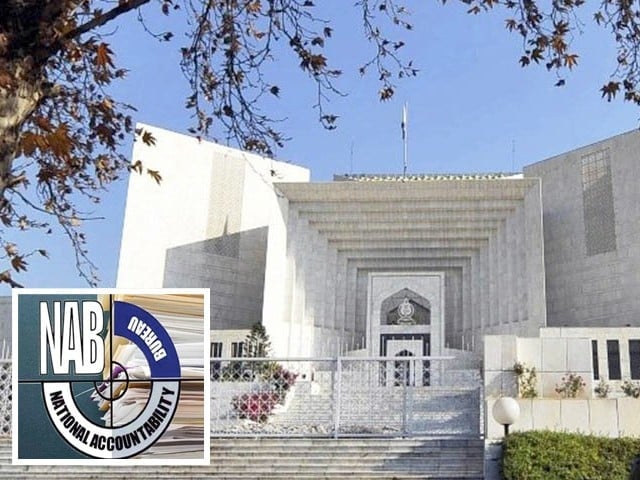Islamabad: The judgment of the case against the NAB amendments was reserved in the Supreme Court after the arguments were completed, the Chief Justice remarked that he would issue a short order soon.
Chief Justice of Pakistan Justice Umar Atta Bandyal remarked during the hearing of the case that the return of NAB references indicates the direction of the law.
The case against NAB amendments was heard in the Supreme Court. Meanwhile, the Chief Justice asked Khawaja Haris whether he has read the NAB report. NAB has given the reasons for the references returned till May, which shows the direction of the law, the references of which persons have been returned till May.
The Chief Justice said that one amendment in Section 23 of the NAB Act came in May and another in June. References returned before May are still with NAB, who will answer these questions on behalf of NAB?
Khawaja Haris replied that many pending cases were returned after the amendments. Is there any provision in these amendments to refer cases to other forums? After these amendments, much of NAB’s work has ended. First there will be investigations after which the cases will be referred to other forums.
The Chief Justice said that no one knows the future of the returning forums. It is not known whether these cases will go to other forums as well. Does NAB have any authority to send cases to other forums?
Khawaja Haris said that NAB does not have the authority to deal with these cases after the amendments. There is also no legal authority to refer cases to other institutions.
Justice Mansoor Ali Shah remarked that there is no need for law to refer cases to other forums. The cases that have been made will go to a forum. Not getting option to send cases to other forums will definitely ask about it.
He said that I have 2 questions, the purpose of the application filed in the Supreme Court was stated to be accountability without discrimination. Why was the serving army officer excluded from the NAB law, in the Isfandyar Wali case it was only said that there is an army act for punishments in the army. Thus, there is Civil Servants Act for civil servants, similarly there is Election Act for politicians.
On behalf of the petitioner’s counsel, the court was told that we have not challenged Clause 5M to grant exemption from the NAB law to serving military officers.
Chief Justice Umar Atta Bandial said that my second question is related to the judges of the Supreme Court. Article 209 lays down the entire procedure for removing a judge from office. If a judge is removed from office by the Judicial Council for making money, who will do the recovery? We are not looking at the conduct of the petitioner, we are only looking that the legislation did not violate public interest and fundamental rights.
The Additional Attorney General told the court that the Attorney General would submit his written reply today. The Chief Justice said that if we had been told, we would have run the regular bench.
Justice Ijaz-ul-Ahsan said that all the cases in the accountability courts have been frozen. Cases worth billions of rupees have been frozen and put on hold. The frozen cases will also affect the rights of those who have this money.
Justice Mansoor Ali Shah remarked that punishments are also available against civil officers and public officials, to which Khawaja Haris said that civil service law only has departmental action and not criminal punishment for corruption.
Justice Mansoor Ali Shah said that a corrupt army officer does not have a direct relationship with the people. If an army officer is the head of an institution other than the army, NAB comes under the law. Judges of the High Court have no jurisdiction over the NAB Act. Under Article 209, only a judge can be dismissed, recovery is not possible.
Khawaja Haris said that NAB should take action if the judge is dismissed.
The Chief Justice said that action should be taken if the state assets are subject to corruption, smuggling or illegal transfer of capital. The lack of concrete definition of these crimes in the law is disappointing. It is the responsibility of the state to make the people prosperous and safe. The NAB law should have clarified which forum the cases will go to.
Justice Mansoor Ali Shah said, “Can we send the matter back to the Parliament by pointing out the flaw in the law?” On which the Chief Justice said that sending the matter again to Parliament, this matter is very important. The question is what will happen to the existing law if we send the matter back to Parliament. There is a parliament but we cannot give instructions to it.
Justice Mansoor Ali Shah said that we can make a request to the Parliament, we cannot give instructions to it. A law can be declared null and void if it conflicts with fundamental human rights. The question is which fundamental rights were affected by the NAB amendments, to which Justice Ijaz-ul-Ahsan said that the issue of public assets is related to fundamental rights.
The Chief Justice said that tell us what was the Harris Steel Mills case, was it a case of corruption, wasn’t the Hajj corruption case under clause three of Article 184. There are examples of pleas against NAB amendments being hearable. The question is whether a law can be applied retrospectively or not, we are showing flexibility in exercising the power to take automatic notice.
Lawyer Makhdoom Ali Khan said that the legislation of one parliament can be overruled by another parliament.
The Chief Justice remarked that while learning from the past, he no longer takes sumoto.
Lawyer Makhdoom Ali Khan said that the NAB law related to military officers has been approved by the Supreme Court in the past. The NAB law is completely silent regarding judges. There is no forum for redressal of grievances against retired judges. Judges continue to write judgments for 6 months after retirement. Make legislators accountable to the people.
Justice Mansoor Ali Shah asked the NAB lawyer that why was the amount of more than 50 million in a reference sent back?, to which the lawyer replied that there was no aspect of financial benefits after the amendment, so the reference was sent back. .
The Chief Justice said that there should have been some measure of how NAB references are made. We are looking at the list, one with 10 million was also wiped. Is there any case of 62(1)F i.e. lifelong disqualification in this list? We are looking at the list, the name of Raja Pervez Ashraf comes under the category of lifetime disqualification.
The NAB lawyer said that there was an amendment in 2021 under which it was said that reference should not be made against the accused who have not taken financial advantage, on which the Chief Justice said to provide us a list of how many such NAB references there are. Those who were not sent to any court.
Additional Attorney General Aamir Rehman said that we will submit the written statement to the Supreme Court today. On which Justice Mansoor Ali Shah said to submit the answers to my 2 questions as well.
The Chief Justice remarked that a flaw in the amendment is that it only talks about money and not abuse of power. I think that the NAB courts of Peshawar will not have any case left.
NAB lawyer said that some cases have been returned to NAB. In the year 2023, 212 while in the year 2022, 336 references were returned to NAB. NAB transferred 30 references in 2023 and 24 in 2022 to banking and customs courts.
The Chief Justice said that how can they send? They have no choice. The NAB lawyer said that 212 and 336 references went to our storage, on which the Chief Justice of Pakistan said “very good”.
Later, the Supreme Court reserved the decision of the case against the NAB amendments. Chief Justice of Pakistan remarked that time is short, hope to issue short and sweet order soon. Will issue a short decree and announce the date soon in this regard.
(function(d, s, id){
var js, fjs = d.getElementsByTagName(s)[0];
if (d.getElementById(id)) {return;}
js = d.createElement(s); js.id = id;
js.src = “//connect.facebook.net/en_US/sdk.js#xfbml=1&version=v2.3&appId=770767426360150”;
fjs.parentNode.insertBefore(js, fjs);
}(document, ‘script’, ‘facebook-jssdk’));
(function(d, s, id) {
var js, fjs = d.getElementsByTagName(s)[0];
if (d.getElementById(id)) return;
js = d.createElement(s); js.id = id;
js.src = “//connect.facebook.net/en_GB/sdk.js#xfbml=1&version=v2.7”;
fjs.parentNode.insertBefore(js, fjs);
}(document, ‘script’, ‘facebook-jssdk’));


